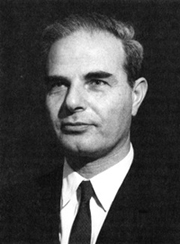Herman Kalckar
| Herman Moritz Kalckar | |
|---|---|
 |
|
| Born | 26 March 1908 Copenhagen, Denmark |
| Died | 17 May 1991 (aged 83) |
| Fields | Biochemistry |
| Institutions |
(Caltech) |
| Notable awards |
Elected member:
honorary degrees from |
(Caltech)
Elected member:
honorary degrees from
Herman Moritz Kalckar (26 March 1908 – 17 May 1991) was a Danish biochemist who pioneered the study of cellular respiration. Kalckar made a number of significant contributions to the development of 20th century biochemistry including:
Kalckar described his family life as “a middle class, Jewish-Danish family—Danish for several generations.” His family life was not financially wealthy but was intellectually rich. His father, Ludvig Kalckar, was a businessman with an avid interest in theatre, especially the work of Henrik Ibsen. His mother, Bertha (née Melchior) Rosalie introduced Kalckar to a variety of French and German writers, including Gustave Flaubert, Marcel Proust, Johann von Goethe, and Heinrich Heine. Kalckar observed that this time allowed his “interest in the humanistic disciplines” to develop and thrive.
In his autobiographical reflections, Kalckar spent little time on his early education and referred to high school biology experience as "somewhat static," except for "some extraordinary demonstrations in human physiology" by August Krogh. Krogh, a physiologist and Professor at the University of Copenhagen, won the 1923 Nobel prize for his description of capillary blood flow and regulation, introduced the principles of human physiology to Danish high school students. Krogh's demonstrations introduced the students to a number of modern physiology instruments and experimental techniques. The experience seems to have profoundly influenced Kalckar's choicer of research area.
Kalckar completed his medical training at the University of Copenhagen in 1933, and then began research for his Ph. D. in Ejnar Lundsgaard's (1899–1968) physiology laboratory; that work established the foundation of a fundamental biochemical paradigm, i.e. "oxidative phosphorylation". During this period, Lundsgaard was preoccupied as physiology department chair, consequently Fritz Albert Lipmann, who had recently fled Germany, served as Kalckar's research mentor. Later, Kalckar and Lipmann both independently developed concepts of a "high energy bond" (which Lipmann famously expressed as "~P") and ATP as a universal "energy carrier."
...
Wikipedia
